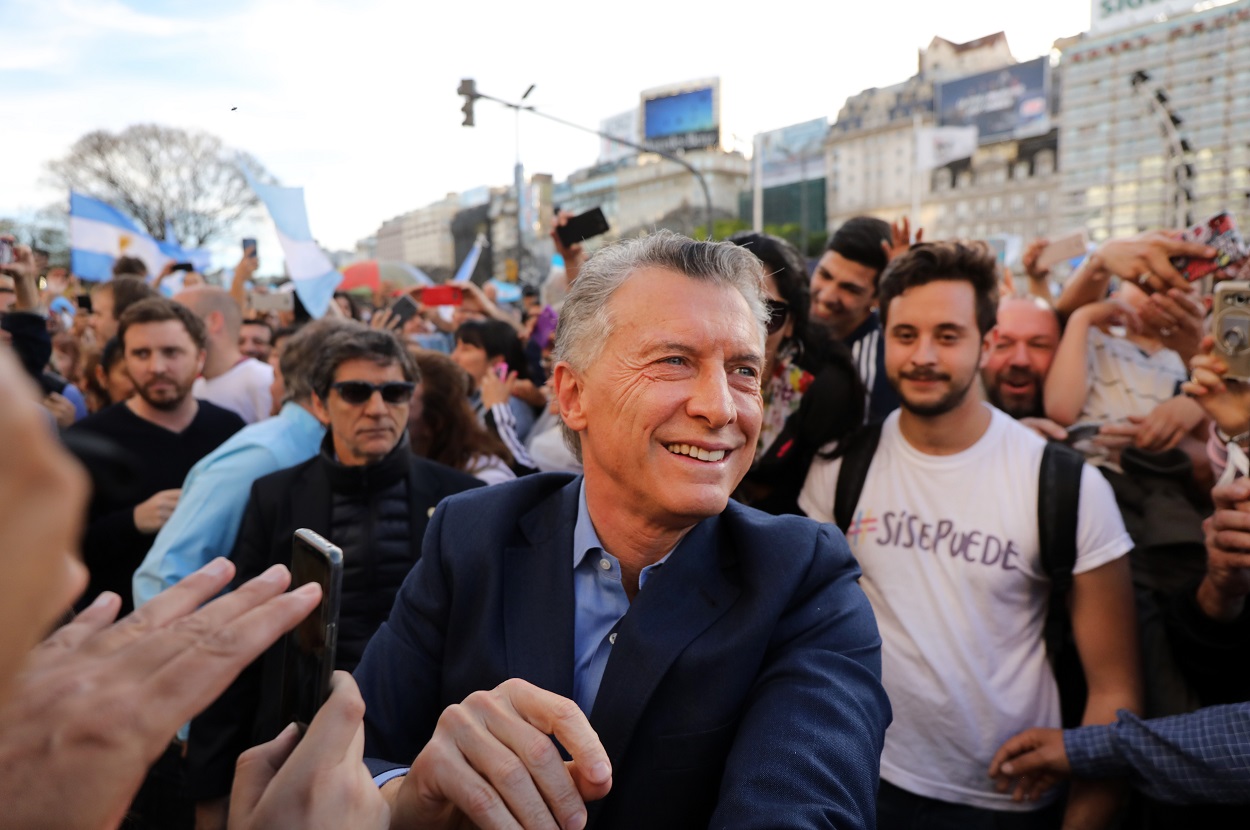BUENOS AIRES – Mauricio Macri’s presidency is coming to an end. With a fall in per-capita income of close to 10% and cumulative inflation higher than 300% in his four years, it would be easy to declare his presidency a failure – which, in terms of economic results, it was.
The economic failure is surprising because Macri faced not only a relatively benign international scenario (no significant changes in its terms of trade, for example), but also because he received unprecedented support from a number of constituencies. Voters put him in the Casa Rosada in 2015 and elected his lieutenant María Eugenia Vidal as governor of the Province of Buenos Aires, the country’s most populous and economically diverse. Voters endorsed Macri massively again in the 2017 mid-term elections. International financial markets embraced his market-oriented policies and financed the equivalent of 4% of GDP in 2016 and 2017, buying into his strategy of a “gradualistic” approach to reform. Multilaterals also provided unprecedented support, particularly the International Monetary Fund, which approved its largest aid package ever.
The economic results were unquestionably bad, and they explain why Macri lost his bid for reelection. But it is still worth pointing out Argentina did make substantial progress during these years. Police corruption was addressed and security improved (homicides fell by 30%); the press spoke freely, and democratic institutions thrived, particularly Congress, both because the government did not have a majority in either chamber, but also because Macri allowed for controversial open-ended debates such as that on abortion which triggered strong emotions throughout 2018.
Interference with the judiciary subsided, and Macri appointed independent judges to the Supreme Court. The ethical standards in public service improved dramatically, leading, for example, to a jaw-dropping reduction in public infrastructure costs of close to 50%. Prioritizing projects with the highest social value led to a significant improvement in the efficiency of public spending. The state was modernized, and deregulation was visible in many areas such as air transportation and the financial sector. Last but not least, markets across the world opened for a wealth of products, while Argentina became a predictable player in the international community, allowing for the icing on the cake: hosting the G20 and closing a trade agreement with the European Union that had been in the workings for 25 years.
What went wrong?
On the economy, it is easy today to provide a storyline of what happened.
Macri started his term with fiscal excesses that actually increased the very high deficit inherited from the previous administration. This was the result of spending increases and substantial tax cuts, which bode well with his supply-side approach to government. In spite of this, plentiful financing allowed the program to start solidly.
By 2017, the economy was in a virtuous cycle. The economy grew 4% that year, while inflation declined sharply – particularly core inflation, which was running well below 20% towards the end of 2017. This combination led to a dramatic fall in poverty rates, which by the end of 2017 was at its lowest reading since at least the early 90s, according to CEDLAS, a local think tank.
However, the continued fiscal imbalance generated a conflict with the Central Bank´s efforts to reduce inflation. Disinflation was problematic for fiscal accounts because pensions have a lag adjustment. Thus, the Treasury lobbied to slow the disinflation process. After winning the midterm elections, perhaps because he thought risks had fallen, President Macri sided with the Treasury and took the momentous decision to change the inflation targets, undermining his own macroeconomic framework and triggering a financial crisis.
The Central Bank had accumulated a substantial amount of foreign exchange reserves, but it had bought them with short-term Central Bank paper. The government had also financed itself with short-term dollar debt, which at the time seemed easy to issue. The change in the inflation targets caused the demand for peso assets to melt, leading to a sudden stop and a depreciation of the foreign exchange, which in turn made the dollar debt more costly. With inflation expectations unanchored and financing all but gone, monetary and fiscal policies were forced into a very contractionary mode, leading to a steep recession.
Luck, inheritance or mistakes?
Much has been argued about the reasons for Macri’s economic failure, and as current Finance Minister Hernán Lacunza has said, luck, inheritance from the previous government, and policy mistakes all played their part. But with the benefit of hindsight it is difficult to blame the outcome purely on luck, as the only relevant negative shock was a big drought in early 2018. While it shaved almost 2% of GDP that year and came at the worst possible time, it is still not enough to explain the ensuing two-year recession or the financial crisis.
The inheritance, while critical, is not enough to explain the outcome either. By the end of 2017 the economy was expected to continue growing in 2018 and 2019 and inflation to reach 10% by the end of Macri’s term. Actually, Macri had managed to deal with the inheritance and had put the economy on a sustainable path.
That leaves us with the mistakes. It is now easy to say that the problem was the fiscal profligacies of the initial two years, but this requires building a counterfactual of what would have happened if Macri had pursued a more aggressive initial fiscal adjustment. One possible such counterfactual is the attempt almost 20 years earlier of the administration of Fernando de la Rúa, who started his government with a focus on fiscal consolidation and was ousted from the Casa Rosada two years into his term in the midst of a political and social crisis. While it has to be acknowledged that some of the fiscal excesses were unnecessary, and carried undue risks (not to speak of minimal political dividends), in fact, gradualism delivered what it was supposed to deliver: the midterm election win.
However, while gradualism may buy you time, it does not buy you the possibility of avoiding fiscal convergence. The mid-term election win was the signal that the time had come to deliver, particularly on the fiscal front. In fact, Macri did move, but the surprise was that he moved in the wrong direction: passing a tax reform that reduced taxes and bullying the Central Bank into lowering interest rates. Combined with the fragile structure of government debt, this unexpected turn is what led to an exit from Argentine assets, triggering the crisis that spanned the last two years of his government.
Macri’s finest hour
The economic debacle led to a stunning defeat in the primary election in August – a kind of test run for the real elections in October. Tired of rampant inflation and a fall in real wages, Argentines shied away from the government, preferring the novel and potentially more gentle and moderate version of Kirchnerism led by Alberto Fernández. The writing was on the wall: Macri was likely to lose the actual election two months later, perhaps by a large margin.
Macri, far from being discouraged, decided to battle through. He launched a 30-city rally that became a massive, peaceful and inspiring cry in defense of democratic values and freedom. As he ploughed through the process he recovered his own pride – and, in turn votes, managing what seemed impossible after the primaries: A big political recovery which allowed him to increase his vote compared to August and attain more than 40% of the votes in the October presidential elections.
This strong showing allows him to leave power emboldened and with a legislative representation that would preclude the incoming government from having an absolute majority, thus ensuring his role as a powerbroker. As Elisa Carrió, a respected representative and Macri supporter stated: “The Republic has been saved”. Macri also excelled in setting the stage for a collaborative transition, a rarity in Argentinian politics. This quickly diffused tensions and will allow for the first orderly transfer of power from a non-Peronist president since 1928. It also allows Argentines to dream of something even more relevant: the emergence of a true two-party system with shared power, forcing both coalitions to cater the median voter – and moderating political outcomes.
Who will be the reformist?
Taking a step back, the failures of the De La Rua and Macri administration beg the question of whether only the Peronists may reform Argentina. However, a closer look shows that they themselves, in due time, were also worn out by power. The Menem administration in the 1990s managed to balance the budget quickly, but was unable to sustain it. The same happened to the Kirchners who, from a situation of fiscal surplus, also slipped gradually into fiscal deficits. Therefore, the problem appears to be structural, something related to how power is spread out in the political system.
So far, nobody seems to have even identified where the dysfunctionality comes from, much less produced a formula to solve it. One hypothesis, for example, claims that since the unions were given the resources to manage the health system back in the early 70s, they became a strong power player, weakening governments and firms alike. This may have unwillingly led to higher fiscal deficits and macroeconomic instability, but also to lower incentives to innovate and increase productivity. A weakened establishment, in turn, became a strong advocate of devaluation and inflation as their only way to improve profitability.
Whatever the actual reason, one thing we know for certain: Whatever it is, it is still present, leading to a dangerous cycle whose dynamics remain latent.
Lessons learned
In conclusion, the last four years leave behind several lessons – and hints of what’s to come.
Paradoxically, in the economic sphere, it seems there has been little progress. For example, the independence of the Central Bank is not being discussed at all in politics, a surprising development considering the instability of the peso and rampant inflation. In the same vein, virtually nobody speaks of the need of better institutions to insure fiscal responsibility. And one of the best innovations of the Macri administration, the floating exchange rate, that managed to insulate the labor market from the shocks faced by the economy (in fact employment grew in 2019!), is now under attack.
Fernández may be able to gather support to implement an economy-wide freeze in all economic variables (wages, prices, utility prices and pensions). He may also use the sharp recent depreciation to increase export taxes and balance the budget, all of which may provide a more stable starting point for a new government. However, it remains to be seen whether he will later be able to identify and diffuse the features, whatever they may be, that eventually start to erode political power, leading to a weakening of fiscal policy and stability.
This is where the final election result provides some room for optimism. The strengthening of democratic institutions, and the idea that power can come and go in a peaceful manner, may provide incentives for politicians to take a longer-term view in their management of the economy and other challenges. The fact that voters have delivered a balance of power may also result in a degree of moderation unusual in Argentina’s history. Seen through that lens, Macri’s legacy looks more positive. In fact, it is still being written.
—
Sturzenegger was Argentina’s Central Bank President from 2015 to 2018. Today, he is Full Professor at Universidad de San Andrés. He taught at UCLA, Harvard Kennedy School and Universidad Di Tella. He was Chief Economist of YPF, Secretary of Economic Policy, President of Banco Ciudad and Member of Parliament in the Chamber of Representatives. He holds a Ph.D from MIT. He recently described the experience of Macri’s Presidency in Macri’s Macro, forthcoming in the Brookings Papers on Economic Activity.







